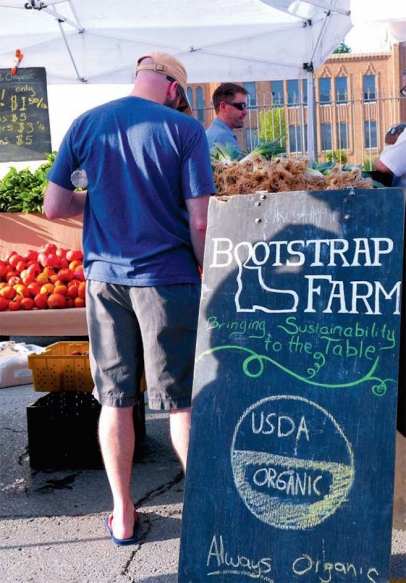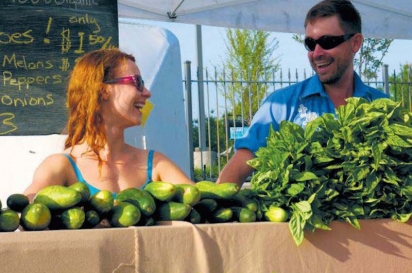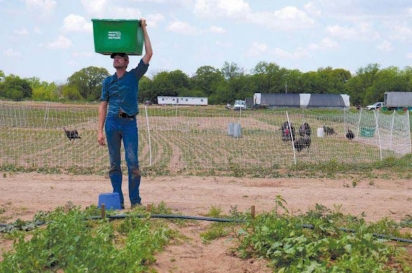Bootstrap Farm Brings Sustainability to the Table
The call comes in at 7:43am from Don Drury, owner of Bootstrap Farm. He quietly sighs, “Hey, I won’t be back at the farm until about 9,” pushing our morning meeting time back a bit.
My thoughts quickly fill with equipment failures, irrigation problems, labor shortages and the unpredictability of Mother Nature that could have caused such a trivial delay. I’m hoping to hear a tale of Don prevailing over some unforeseen force, aimed at derailing delivery of his community-supported agriculture (CSA) members’ shares.
At the very least, something that would clearly illustrate the unpredictable knuckleballs that small farmers face. I want it to be a hardship well beyond my capacity to solve. I hope the reason will make me glad I didn’t follow my youthful dreams of becoming a farmer.
“I had to drop off vegetables to the Dave Matthews Band last night and they invited me to eat with them and hang out backstage— so I stayed in Tulsa last night.”
Of all the ways I expected to be envious of farm life, this wasn’t in a galaxy anywhere near the romantic life I pictured. Aside from this unexpected celebrity connection, Don is forging a noble and seldom-traveled path toward a locally focused, sustainable, organic farm 40 miles east of Tulsa.
The thought of a superstar rock band giving Don the royal treatment was warming and fitting as I drove through the gorgeous farmland of Creek County listening to the audio version of Dan Barber’s inspiring new book, The Third Plate: Field Notes on the Future of Food, where the farmers take center stage.
A book 10 years in the making, penned by one of the world’s most influential chefs, it turns the spotlight on the intricacies of real farming to explain why the farm-to-table movement isn’t completely working. Barber makes the case that the complexities of farming should dictate what is on our plate instead of cherry-picking ingredients based on the whims of chefs or our partialities.
I’m 12 hours into the book and Dan’s voice is getting a bit hypnotic … so I artist search “Dave Matthews Band.” The music elevates the farmstead scenery like fresh herbs boost a great dish.
What better place to try to get a glimpse of what the future of food in Oklahoma might look like than to visit a farm where “bringing sustainability to the table” is the motto and the mission?
Upon arriving at Bootstrap Farm, the first thing I notice is the absence of a traditional farmhouse and barn. In place of the pastoral farm view are a mobile home and a semi-trailer that’s part cold storage, part processing facility and office.
“I’m trying to build a farm that I can build a family around,” Don explains as we walk through the assorted fields of vegetables and cover crops. His tall, lean build always moving with a purpose mimics the efficiencies he’s sharpening everywhere we look.
“I don’t import fertility anymore. These guys helped me close that cycle,” Don says, gesturing towards his turkeys and sheep. The ruminants are enjoying lush grass while the turkeys feast on grasshoppers and other delicacies in a roomy paddock that is moved to fresh ground every few days. The turkeys range from several tiny chicks to a few stately toms weighing over 40 pounds. One of the toms, we agree, is destined for my Thanksgiving table.
“I always knew I wanted to be in agriculture so I started by WWOOFing it for a season in Ontario,” Don says. I am relieved to learn he didn’t spend that season living with wolves, but interning with World Wide Opportunities on Organic Farms, where willing workers exchange labor for food, accommodations and knowledge.
“Not a lot about Ontario translates to Oklahoma, but it gave me a start in organic farming,” he says.
Bootstrap Farm started out on leased land in Bixby in 2008. Don farmed there for a season and a half, all the while looking for the place he wanted to farm for the long term. After fully examining the soil and surrounding ecology he purchased the acreage near Yale and started building the sustainable, organic farm he’d imagined years earlier.
“Right after I bought the land, the guy says ‘By the way, it never rains here’ and he was right,” Don says with a resonant laugh.
As we pick sugar snap peas for the CSA baskets, Don describes the water pump that will be delivered in a few hours to replace a broken one. The pump is destined for a well 60 feet below the heart of the raincloud-repelling farm. In the days to follow, Don will build a new filtration system to keep sand from blowing up another $800 pump. I can’t make sense of this system he is describing or how he’s managed to pick twice as many peas as I uneasily set my harvest on his tailgate.
I ask about the type of farming that Don’s neighbors do.
“They’re conventional farmers, not heavy sprayers, good neighbors. I don’t judge. One day I was at the supply store and I bumped into Fred from across the road, and he told the seed salesman ‘You ought to stop by and see what Don’s doing. It’s amazing.’ That blew my mind.”
Bootstrap’s journey to organic certification took three years. While many farmers might justifiably bemoan the paperwork and hurdles involved with the certification process, Don shrugs, “It wasn’t too bad. If they ask for three pages of data, I give them 60.” He keeps meticulous records of everything that goes in or out of his fields, down to the exact time of day a particular vegetable variety is harvested.
Don’s girlfriend, Chrysta Mishele, arrives at the farm to help with washing and packaging vegetables. It’s impossible to ignore the duo’s commitment to the ecology of the farm and the end product destined for their customers. “I instantly felt closer to you when I found out you were in the CSA. Thanks for supporting my honey,” she radiates. The compliment caught me off guard and reminded me of how Carlo Petrini, founder of Slow Food, views farm direct customers not as consumers but co-producers. I unquestionably felt like a co-producer standing there sweaty and dirty on the farm.
Although my day was wonderful, I was leaving with the understanding that I couldn’t do this. To call Don Drury a farmer seems like calling a nuclear physicist a dabbler in science. In human scale, organic agriculture farmer also means owner, operator, record keeper, ecologist, mechanic, hydro-geologist, plumber, USDA liaison, director of livestock and field operations, human resources manager and, most of all, laborer, and that’s just in a typical day.
I say farewell and leave a copy of Dan Barber’s book with Don, seeding our ensuing discussions on the future of food. As I drive off through the rolling hills of Payne County, I think of how rare it must be that a young, first generation farmer sets out to build a farm as a foundation for a family. The numbers would tell you that Don’s chances of achieving this foundation aren’t great, but with a name like Bootstrap and a spirit of always improving his operations, I would bet on him. I am betting on him.
Next, Dave Matthews Band’s The Best of What’s Around croons over the radio. Usually a musical time tunnel backward, this time it took me forward. It took me to a time when talented farmers like Don have rivaled and perhaps eclipsed the rock-star status of chefs. I thought of a future when a farmer receiving backstage VIP access isn’t surprising news at all. I saw a future of food where eaters, home cooks and chefs let agrarians like Don take the reins and bring sustainability and delicious food to our tables.






